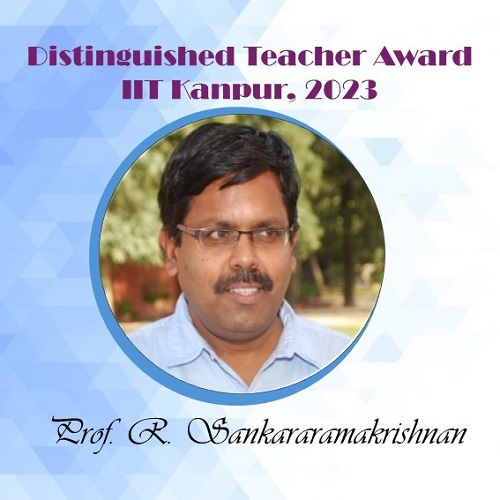
In conversation with....
Prof. R. Sankararamakrishnan
recipient of the “Distinguished Teacher Award”
IIT Kanpur, 2023
MFCEM: Congratulations Prof. Sankar for the “Distinguished Teacher Award”. What does this award mean to you?
R. Sankar: This is a huge honor and recognition for me. I thank IIT-Kanpur for this prestigious award which I will cherish throughout my life.
MFCEM: You are a structural biologist, what is your approach to teaching biology to students from such diverse disciplines of sciences and engineering at IIT-K? How do you make it relevant and engaging for the students?
R. Sankar: Biomolecular structures look complicated to begin with. However, I use visualization softwares and molecular models in the class to demonstrate the intricacies of protein and DNA structures. As the knowledge of structures helps us to understand the mechanism of the function of biomolecules, at the end of the course, the students appreciate the importance of knowing the three-dimensional structures of biomolecules. The students even after graduating from BSBE, personally contact me to convey how much they appreciate the Structural Biology knowledge gained through the course and how it helps them in their current job, be it industry or post-doc position. I have had students from engineering and experimental biology background. I really enjoyed teaching them. I start with the basics of biochemistry before getting into structural aspects of biology. I also personally talk to the students to make sure that they understand the basic concepts of structural biology. In fact after few classes, they start enjoying the structures and in many cases, they are intrigued by the beauty of nature’s work and will be curious to know why this beautiful structure is adopted and how it is important for the function of a specific biomolecule.
MFCEM: Christa McAuliffe a teacher and the first American civilian selected to go into space, famously said “I touch the future. I teach.” In today’s setting too, answers to many of the medical challenges facing our society today seem to lie at the intersection of Biology and Engineering. Having said so, how do you pique the interest of some of the brightest young minds that come to this institute, to even consider some of these challenges?
R. Sankar: Biology today is heavily interdisciplinary in nature. IIT-Kanpur is known for imparting finest training in engineering education. When BSBE Department was established, IIT-Kanpur’s vision is to utilize and exploit this ecosystem to establish frontier areas at the intersection of biology and engineering. In general, when students from engineering background want to work on biology-related problems, they generally show lot of interest in drug development, docking, bioinformatics, modeling, machine learning and simulations. My first UG student from Chemistry department worked on a structural bioinformatics project. My first M.Tech student came from Computer Science background and worked on predicting translation initiation sites using artificial neural network. I had Ph.D. students who joined in my lab with B.Tech in Chemical Engineering. My Ph.D. students from conventional biology background learned script languages like Perl and Python as part of their research projects. They have all done phenomenal work, published excellent papers and I am proud of each one of them. In all cases, when they want to do biology research, they lacked either basic biology knowledge or computational background. They are not initially confident whether they will be able to make significant contributions. However the environment in BSBE and IIT-Kanpur help them to learn the fundamentals quickly and with little encouragement, they are soon comfortable to pursue their projects. The interdisciplinary nature of biology in general and my research area in particular is a strong factor to attract the students from diverse background to take up these challenging projects.
MFCEM: Were there any teachers who left an indelible mark on you? Would you like to share some memories?
R. Sankar: I have a long list of teachers who inspired me and left an indelible mark on me and I thank everyone of them. My parents are my first teachers. My father was a middle school teacher and I attended his tuition when he taught one of my classmates. My mother made sure that we finished our homework in time and revised syllabus before the exams. I would like to express my gratitude to all my school teachers and especially to Mr. Sankaranarayanan Sir and Mr. Palanivelu Sir. I did my B.Sc. Mathematics and Chemistry under Double Majors system. Both the Chemistry and Maths Professors had great impact on me. I want to mention Prof. Rajaraman, Prof. Devarajan, Prof. Krishnamoorthy, Prof. Sitaraman and Prof. Venkatachari from Chemistry and Maths departments. During my Ph.D. course work, the course instructors were exceptional. Prof. C. Ramakrishnan, Prof. P. Balaram, Prof. M.R.N. Murthy and my thesis supervisor Prof. Saraswathi Vishveshwara made my transition to Biology easier. I particularly always wanted to emulate Prof. C. Ramakrishnan’s style of teaching in my class.
MFCEM: In premiere institutes of higher education such as the IITs, teaching goes together with carrying out cutting edge research and may prove a bit daunting to young faculty who join. Would you like to share some thoughts with your younger colleagues.
R. Sankar: It is an important point. While doing cutting-edge research is extremely important, teaching should not be viewed as a burden. In fact, teaching to bright minds in institutes like IITs will sharpen our knowledge and the basics will be stronger. I agree that for a new faculty, it may be bit difficult to balance both teaching and research in the beginning. With little bit of efforts, one should be able to excel in both domains over a period of time and we must keep in mind that these are not mutually exclusive. After attending your class, students may want to do some short-term projects in your lab. They may even join for the graduate program. Benefits of teaching while doing research in frontier areas outweigh any other disadvantages.
MFCEM: Thank you, Prof. Sankar, for sharing your thoughts and for your time. We appreciate it much.

